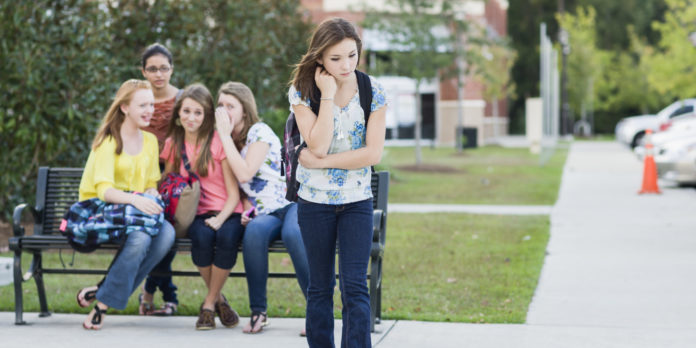
For millions of children, bullying makes adolescence a miserable experience to live through. Now, a new study suggests its effects linger years later, with profound implications for the mental health of young adults.
The new research, published in The BMJ medical journal, found that bullying during the teenage years is associated with twice the risk of depression in young adulthood. Because of the high incidence of bullying among schoolchildren and its strong association with depression, the potential population-wide effects are staggering: According to the study, nearly a third of all cases of depression in young adults could be directly attributable to experiences of bullying as a teen.
The findings to add to a growing line of evidence documenting the devastating effects of childhood bullying. In a particularly notable study published in The Lancet Psychiatry in April, researchers found that the mental health consequences of bullying can be even more severe those suffered by victims of child abuse.
For this latest study, Dr. Lucy Bowes and colleagues at the University of Oxford analyzed data from 3,898 participants enrolled in the Avon Longitudinal Study of Parents and Children (ALSPAC), a UK community-based birth cohort. Participants completed a questionnaire about bullying at 13 years old and an assessment designed to identify depressive illness when they were 18.
Of the 683 participants who reported experiencing frequent (more than once a week) bullying at age 13, nearly 15 percent were depressed by age 18 — almost triple the rate for teenagers who had not been bullied.
An additional 1,464 participants experienced occasional bullying (one to three times over a six month period), of whom more than 7 percent were depressed as young adults. Only a small percentage of individuals who were not bullied as teenagers reported being depressed five years later.
Although the type of bullying took on different forms, name calling was the most common. Other types of bullying reported by participants included being excluded by their peers, having lies spread about them, having their belongings stolen, and being threatened, blackmailed or even beaten.
While the study does not prove that being bullied causes depression, the researchers say their findings demonstrate a strong dose-response relationship between the frequency of bullying in adolescence and the risk of developing depression at age 18, with more frequent victimization increasing the odds of severe and persistent depression.
Nearly two-thirds of the frequently bullied teenagers who developed depression said that their illness lasted for more than two years.
The analysis factored out other known risk factors for depression including mental and behavioral problems, previous bullying in childhood, and stressful life and family events, to focus on the relationship between bullying in teenage years and depression as adults. The results were the same for both males and females.
“The longitudinal nature of our study reduces the possibility of reverse causality, whereas the impact of victimization on depression has both clinical and biological plausibility. All these points support the hypothesis that this is a causal relationship,” the authors wrote. If this is the case, the researchers say that up to 30% of the burden of depression in early adulthood could be attributable to victimization in earlier teenage years, potentially explaining a “substantial contribution to the overall burden of depression.”
“Depression is a major public health problem worldwide, with high social and economic costs,” the researchers wrote. These new findings suggest that interventions to reduce bullying in school could lessen depression later in life.
“Such substantial work should lead to further reflection about the need for early intervention,” Maria M. Ttofi from the University of Cambridge wrote in an accompanying editorial. “Effective anti-bullying programs can be seen as a form of public health promotion.”
Dr. Bowes said current research is evaluating which intervention methods might work best. “In general, it appears that the more intensive interventions that involve educating students and staff about bullying, and that increase parental involvement and communication with the school, are the most effective at reducing overall levels of bullying,” she said.
